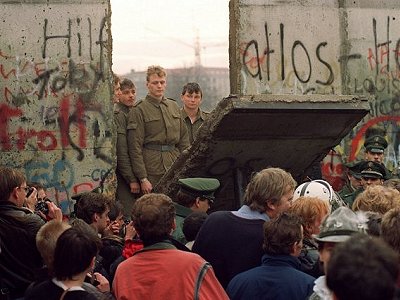
THE WALL AND WHAT HAPPENED NEXT
How the last twenty-five years changed everything – and nothing
In November 2014 it will be 25 years since Europe’s 9/11 – a very different 9/11 to America’s. On November 9, 1989, the people of East Berlin, making sense of a chaotic Communist Party press conference, realised there were no grounds to prevent them from crossing into West Berlin; hours later, pick axes were being taken to the hated Wall.
It is considered the most arresting and visual image of a year of revolution but only if we look on the bright side. Months earlier, the image of a man with shopping bags standing in front of the tanks of the People’s Liberation Army of China - a man who subsequently went ‘missing’ and has not been seen since – dominated coverage of the appalling crime of Tiananmen Square.
At the time, the consensus of the wider world was that history was on the side of democracy, not authoritarianism, and that it was only a matter of time before the Communist Party of China relinquished its grip on power. The secular litany of freedom, democracy and markets, however, has been tainted by subsequent events. Fundamental liberties have been compromised in managed economies like China and, to a lesser extent, Russia; many people have made a trade-off between getting rich and becoming freer – as if there has to be such a choice. Democracy has evolved in peculiar ways in places like Bulgaria and Hungary, where illiberal polities are the norm and toxins like antisemitism are re-surfacing. Meanwhile, in the west, people have willing traded personal privacy for greater security and the crash of 2007 – 2008 has reminded a fresh generation of the instabilities and inequalities of capitalism.
There are still many reasons to cheer this silver anniversary, for it demonstrated the power of populations and the weakness of those who would control them, giving us a giddying picture of what happens when the mighty are cast down from their thrones – a glimpse of the world to come. In Ephesians 3: 10 St. Paul says that through the church the wisdom of God in its rich variety might be made known to the rulers and authorities in the heavenly places. Only our parochialism - the limited sense that church means only the community where I gather each week - hinders a grasp of the panoramic sweep of the Church, which is to demonstrate the purpose of God in this world. During the Communist era, this Church was heavily persecuted, but not destroyed and it has far outlasted the regimes which arrogantly sought to dispose of it.
The former Chief Rabbi, Jonathan Sacks, said in 2014:
The West misread the twenty-first century. This is not an era of secular ideologies. It is an era of de-secularisation. Our greatest challenge is not political or economic or military. It is, in the deepest sense, spiritual. No-one expected this, and we have not been equal to it.
The Church is fundamental to human history and faces Sacks’ existential challenge with the rest of the world. As it encounters new and brutal forms of persecution in the Middle East, old restrictions in China, the risks of illiberal co-option in Eastern Europe and cynical materialism in the West, the challenges are complex and, at times, overlapping. To demonstrate the wisdom of God to the world, we must be equal to Sacks’ standard.
1989 was a wonderful year of freedom for the global Church. As we celebrate the anniversary, the picture is challengingly different today.
POPULAR ARTICLES

Obama's Covert Wars
The use of drones is going to change warfare out of all recognition in the next decades.

Through A Glass Starkly
Images of traumatic incidents caught on mobile phone can be put to remarkable effect.

What Are British Values?
Is there a British identity and if so, what has shaped the values and institutions that form it?


